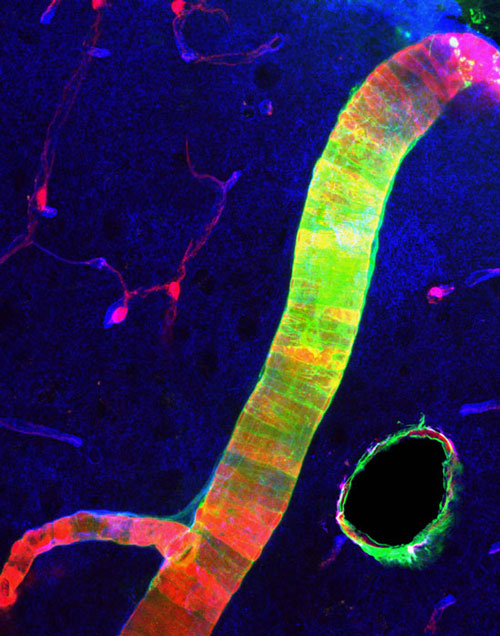Why Do We Sleep?
- Through most of my career in Sleep Medicine, it has not been clear why we need sleep. The answer is now becoming clear.
A big reason we need sleep is to remove toxic materials from the brain. In addition to arteries and veins, the body has lymph vessels. These lymph vessels remove waste from our tissues. Liquid filled with waste products moves through the lymph vessel network between cells, and through larger lymph vessels into the blood. The brain does not have lymph vessels (though it has arteries and veins). Therefore, till recently, we did not know how waste from the brain is removed.
The brain’s blood vessels are surrounded by doughnut-shaped tunnels. The inner wall of each such space is made of the cells of the vessel walls. The outer wall of each space is made of brain cells called astrocytes. Astrocytes are different from the brain cells most people have heard of – the neurons or nerve cells. They are support cells. Thus, the blood vessels in the brain are surrounded by drains through which liquids can flow quickly.
GLYMPHATIC SYSTEM
 Liquids cannot easily flow between the blood vessels and the tunnels. However, the astrocytic outer wall is filled with water channels, so liquids can flow easily through the outer wall into and out of brain spaces. Therefore, these tunnels or drains in the brain perform a similar function as lymph vessels in the body. As brain arteries pulsate, fluid surrounding the brain (cerebro-spinal fluid or CSF) is forced into these tunnels or spaces. It then moves through the astrocytes into brain tissue. It picks up toxic waste products, and moves back through the astrocytes surrounding brain veins into the tunnels. The tunnels surrounding larger brain veins eventually continue into the neck. Here they join lymph vessels. Therefore, this tunnel system in the brain has been named the glymphatic system. The glymphatic system has been well characterized by Dr. M Nedergaard, among others.
Liquids cannot easily flow between the blood vessels and the tunnels. However, the astrocytic outer wall is filled with water channels, so liquids can flow easily through the outer wall into and out of brain spaces. Therefore, these tunnels or drains in the brain perform a similar function as lymph vessels in the body. As brain arteries pulsate, fluid surrounding the brain (cerebro-spinal fluid or CSF) is forced into these tunnels or spaces. It then moves through the astrocytes into brain tissue. It picks up toxic waste products, and moves back through the astrocytes surrounding brain veins into the tunnels. The tunnels surrounding larger brain veins eventually continue into the neck. Here they join lymph vessels. Therefore, this tunnel system in the brain has been named the glymphatic system. The glymphatic system has been well characterized by Dr. M Nedergaard, among others.
There is not much liquid flow through these tunnels when we are awake. When we fall asleep, the space between brain cells expands by as much as 60%. This expansion allows increased flow of glymphatic fluid from brain tissue into the glymphatic system. This expansion of the space between brain cells is controlled by a brain hormone called norepinephrine. Norepinephrine helps keep us awake. Its levels fall during sleep and the space between brain cells expands. Thus, more brain waste is removed when we sleep.
Disturbed Sleep
If sleep is important for brain waste removal, then disturbed sleep should lead to more brain toxins accumulating, and clinical symptoms. That is exactly what happens. People forced to stay awake show neurological symptoms – impaired concentration and memory, fatigue and daytime sleepiness, irritability, moodiness, confusion, hallucinations, seizures, and even death. A brain waste called beta-amyloid accumulates in the brain during wake and is removed during sleep. Sleep-deprived mice accumulate beta-amyloid in excess. Excessive beta-amyloid in humans is associated with Alzheimer’s disease.
Therefore, a big reason why we sleep is so the brain can get rid of toxic materials. If we do not get enough sleep (and too many of us do not), or if we do not get treatment for sleep disorders such as sleep apnea and insomnia that disturb sleep, we accumulate brain toxins.









